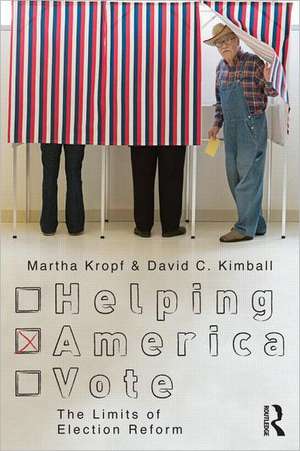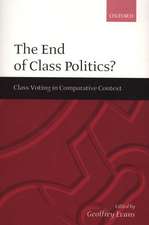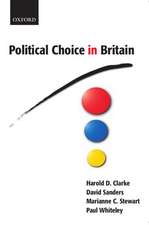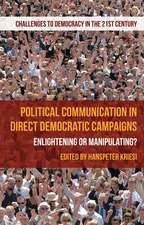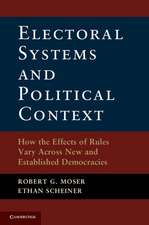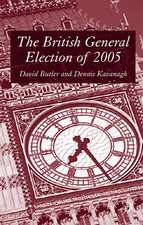Helping America Vote: The Limits of Election Reform: Controversies in Electoral Democracy and Representation
Autor Martha Kropf, David C. Kimballen Limba Engleză Paperback – 20 dec 2011
Helping America Vote is focused on the conflict between values of access and integrity in U.S. election administration. Kropf and Kimball examine both what was included in HAVA and what was not. Widespread agreement that voting equipment was a problem made technology the centerpiece of the legislation, and it has remedied a number of pressing concerns. But there is still reason to be concerned about key aspects of electronic voting, ballot design, and the politics of partisan administrators. It takes a legitimacy crisis for serious election reforms to happen at the federal level, and seemingly, the crisis has passed. However, the risk is still very much present for the electoral process to fail. What are the implications for democracy when we attempt reform?
| Toate formatele și edițiile | Preț | Express |
|---|---|---|
| Paperback (1) | 407.11 lei 6-8 săpt. | |
| Taylor & Francis – 20 dec 2011 | 407.11 lei 6-8 săpt. | |
| Hardback (1) | 1055.32 lei 6-8 săpt. | |
| Taylor & Francis – 20 dec 2011 | 1055.32 lei 6-8 săpt. |
Preț: 407.11 lei
Nou
Puncte Express: 611
Preț estimativ în valută:
77.91€ • 80.38$ • 65.94£
77.91€ • 80.38$ • 65.94£
Carte tipărită la comandă
Livrare economică 05-19 martie
Preluare comenzi: 021 569.72.76
Specificații
ISBN-13: 9780415804080
ISBN-10: 0415804086
Pagini: 168
Ilustrații: 12 tables and 15 line drawings
Dimensiuni: 152 x 229 x 13 mm
Greutate: 0.24 kg
Ediția:1
Editura: Taylor & Francis
Colecția Routledge
Seria Controversies in Electoral Democracy and Representation
Locul publicării:Oxford, United Kingdom
ISBN-10: 0415804086
Pagini: 168
Ilustrații: 12 tables and 15 line drawings
Dimensiuni: 152 x 229 x 13 mm
Greutate: 0.24 kg
Ediția:1
Editura: Taylor & Francis
Colecția Routledge
Seria Controversies in Electoral Democracy and Representation
Locul publicării:Oxford, United Kingdom
Cuprins
1. Introduction: The Context of Election Reform 2. How Does Definition of the Problem Affect the Solution? 3. Did the Reforms Increase Accuracy? 4. At What Cost? The Unintended Consequences of Reform 5. We Mostly Eliminated the Butterfly Ballot…Isn’t That Enough? 6. Defining the Problem in Human Terms: Who Implements Reform? 7. What Have Reforms Accomplished?
Notă biografică
Martha Kropf is Associate Professor of Political Science at the University of North Carolina–Charlotte.
David C. Kimball is Associate Professor of Political Science at the University of Missouri–St. Louis.
David C. Kimball is Associate Professor of Political Science at the University of Missouri–St. Louis.
Recenzii
"Helping America Vote is an excellent entry for the Controversies series. The authors’ emphasis on ‘the change you make depends on how you perceive the problem’ is a very good one; it not only gives a focus to the book, but by itself it will be a lesson to students who read it."
—Richard Niemi, University of Rochester
"This is an impressive work—a valuable summary and evaluation of election reform efforts following the 2000 Presidential election, covering costs as well as intended benefits. While reporting original research, the authors have produced an accessible document that will be of use to policy makers and administrators as well as to researchers and students."
—Robert Sabin Montjoy, The University of New Orleans
—Richard Niemi, University of Rochester
"This is an impressive work—a valuable summary and evaluation of election reform efforts following the 2000 Presidential election, covering costs as well as intended benefits. While reporting original research, the authors have produced an accessible document that will be of use to policy makers and administrators as well as to researchers and students."
—Robert Sabin Montjoy, The University of New Orleans
Descriere
Helping America Vote is focused on the conflict between values of access and integrity in U.S. election administration, examining both what was included in the Help America Vote Act, and what was not. Widespread agreement that voting equipment was a problem made technology the centerpiece of the legislation, but, there is still reason to be concerned about key aspects of electronic voting, ballot design, and the politics of partisan administrators.
